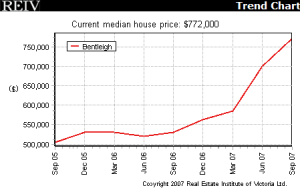 My goodness it’s neighbourly out there today. All I did was go for a walk to the supermarket, and on the way back had a chat with the bloke next door, taking his young kids for a short walk, who thanked me for last night letting him know his car lights were left on; the bloke across the street, sweeping the leaves from the gutter; and we both got a wave from the people next to him, driving off somewhere.
My goodness it’s neighbourly out there today. All I did was go for a walk to the supermarket, and on the way back had a chat with the bloke next door, taking his young kids for a short walk, who thanked me for last night letting him know his car lights were left on; the bloke across the street, sweeping the leaves from the gutter; and we both got a wave from the people next to him, driving off somewhere.
Maybe we’re all in a good mood today because real estate prices have continued to rise ridiculously high — the latest REIV figures show the median price up about 50% since I bought here. (My house is on the small side; I paid a fair bit less than the median, thankfully.)
- 4/7/2007: How about instead triggering gentrification in some of the cheaper suburbs, so the demand is spread around? You can’t move places to be closer to the CBD, but you can level the playing field a bit.
9 replies on “In your neighbourhood”
Daniel
well done on buying when you did.
You obviously didn’t buy a dud.
I think Bentleigh is one of those suburbs better known by its next-door suburb (in this case, East Bentleigh)
Rog.
But the sad fact remains that beginner home buyers are shut out as the prices rise. It’s going to become harder, for sure.
Yes, well done obviously on buying when you did. Scary though it must’ve seemed at the time, it was a great idea.
Wise in retrospect. How many times has that worked for me. How many times have I not done it so that it would work for me.
> How about instead triggering gentrification in
> some of the cheaper suburbs
Or perhaps make living in the new and outer suburbs not suck so much. Transport, facilities, trees…
cp, if you click through, you’ll find that’s the point of that post (with my particular beef being transport, of course.)
Toria, yes and no. The problem is the cheap/affordable suburbs are where people don’t want to live. That can be fixed.
The thing is, I wouldn’t call that gentrification. I’d call it providing basic facilities and quality of life.
Yes, I saw that. But to clarify, I understand the term “gentrification” in a generally less than positive light, in that it causes (and is in a way designed to cause?? hmm) displacement of those who can least afford it:
“a phenomenon in which low-cost, physically deteriorated neighborhoods undergo physical renovation and an increase in property values, along with an influx of wealthier residents who may displace the prior residents.”
Improvement to attract new residents is not the point. Improvement should happen to places that need it, regardless, and new developments should be contingent on the same things being in place from the outset.
Of course that’ll never happen while there is a buck to be made by slapping on some more little boxes.
My main concerns are (i) public transport (ii) walkable, affordable shops and (iii) something to do.
(and apologies if the html doesn’t work, there is no preview button).
(and apols for the double/triple post; I thought the first hadn’t gone through, and wanted to expand on my thinking)
CP: ‘My main concerns are (i) public transport (ii) walkable, affordable shops and (iii) something to do.’
There is such a place and it has affordable housing.
It’s called Werribee.
Taking each point:
(i) On rail line with services to Melbourne CBD and Geelong. Off-peak you can use (admittedly infrequent) V/line trains and be in the CBD in 30 min – hardly different from somewhere like Bentleigh.
(ii) 3 supermarkets and a full-range of specialty shops and eateries in a traditional walkable main street with old buildings. Werribee Plaza is a short bus trip away for people who want the mega-mall.
(iii) Riverside walks & canoeing, cultural centre down the river end, library, pool (closed for refurbishment) and attractions around Werribee Mansion. Unlike Pakenham or Melton the beach is not a whole day trip; it’s merely 20 minutes by train to Altona.
Better not tell too many people, otherwise houses might end up nearer to $300k than $200k!
It’s not fasionable and inner-city journalists don’t know about it. So not many talk about it.